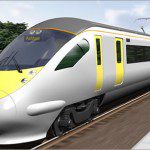Republican Rick Scott said Monday night in his final debate with Democratic opponent Alex Sink, Florida should not move ahead with high speed rail unless the project is fully funded by the federal government. Scott made these short-sighted revelations, even as officials of the Department of Transportation were celebrating an additional $800 million received in grant funding.
 “Every project we do, we have to get return for taxpayers,” Scott said in the Monday night debate. “So the way I look at it, on the high-speed rail, if the federal government is going to fund all of it, and there’s no – there’s nothing (that’s) going to cost the state any money, let’s look at it.”
“Every project we do, we have to get return for taxpayers,” Scott said in the Monday night debate. “So the way I look at it, on the high-speed rail, if the federal government is going to fund all of it, and there’s no – there’s nothing (that’s) going to cost the state any money, let’s look at it.”
Scott went on to state that a final feasibility study should be undertaken to, as he put it, “look at exactly what the state is responsible for”.
Now bear in mind that Florida has been studying high speed rail for over thirty years, since 1976. But, Mr. Scott may not be aware of this as he only moved to Florida seven years ago.
Also, recall that the Tampa to Orlando portion of the high speed rail is estimated to cost $2.7 billion according to the Florida High Speed Rail website and already, the state has received $1.25 billion in federal monies under the American Recovery and Reinvestment Act. So, with the additional funding of $800 million received from the federal government on Monday, the funding gap on the project is $650 million. In other words, with another $300 million, anticipated to come from the federal government, Florida only needs $350 million to meet the high speed rail project cost.
Lacking in vision, no where in Scott’s response did he mention in Monday’s debate the projected number of jobs–directly and indirectly–the high speed rail line from a Tampa-Orlando would create or the likely income and revenues to be generated.
Again, according to the Florida High Speed Rail website, the Tampa-Orlando high speed rail leg is projected to create 23,000 job-years of direct construction jobs and more than 48,000 job-years of work, direct and spin-off employment during the four-year construction period. The peak employment period will likely be between the fall of 2012 and 2014 when close to 10,000 workers are expected to be directly employed in building the system. FDOT further projects that once operation begins, the system will directly employ approximately 600 people and another 500 indirectly on an on-going basis.
Not only does Mr. Scott fail to take into account the jobs, income and revenues to be generated from high speed rail, but his imagination cannot stretch to envision the potentially new Super Region that can be created by linking the Tampa Bay area to Central Florida and all that goes with it.
“Combined, these two regions have a workforce of 4.2 million and a population of more than 7.2 million, major assets such as two international airports, three deepwater ports, a space port, top tourism resorts, wide range of space, aerospace, bio-medical, manufacturing and finance industries and substantial environmental assets including some of the finest beaches in North America. The SuperRegion also has five major performing arts facilities and a half dozen major sports facilities”, FDOT website notes.
But all of this escapes Mr. Scott and his only concerns are slashing the Florida budget while making sure that high speed rail does not cost the state anything, cutting taxes on businesses and the wealthy and ending the stimulus, which he falsely claims has not created one job. However, Scott is not alone as front-runner in the U.S. Senate race, Republican and Tea Partier, Marco Rubio, also echoes his sentiments, that the state should not chip in on the high speed rail!
Yet, Scott and Rubio would have the voters of Florida believe that they are really concerned about jobs. Wish that were true. Without any vision, there will be no jobs for Floridians. And as the old saying goes, where there is no vision, the people perish.
Democrat Alex Sink supports plans for high-speed and commuter rail lines planned for Florida. Well, that’s a very good thing. But Sink must set out a well-articulated vision on how Florida might achieve its goals, including funding, in this area.


